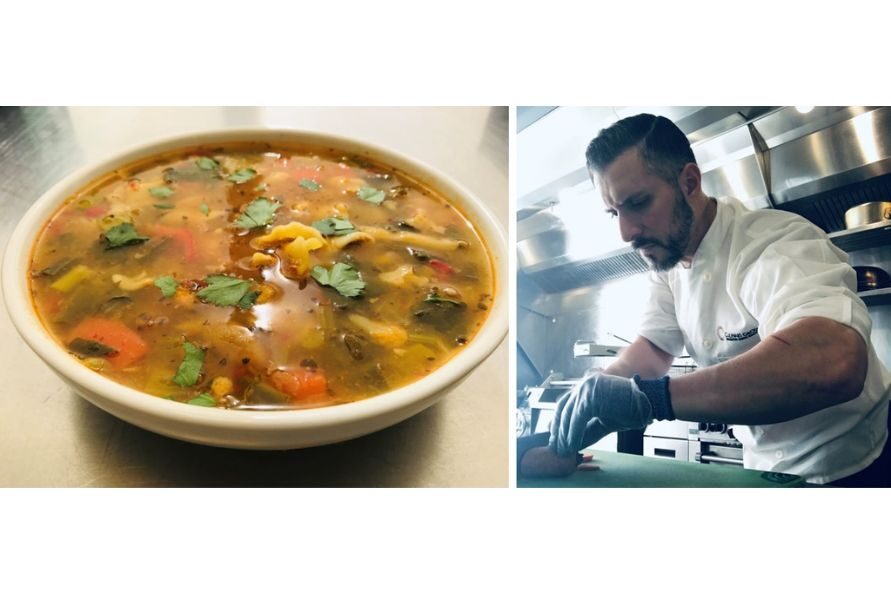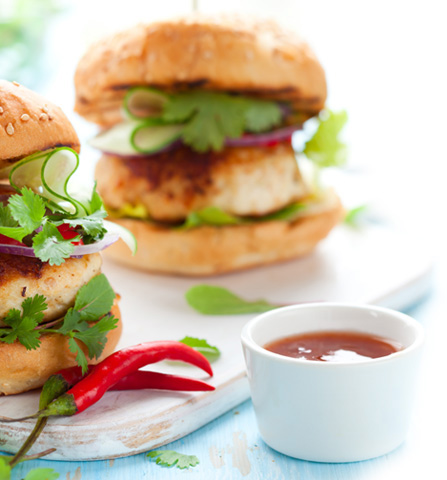High above the crowds, food waste warrior pursues waste-avoidance with a passion
NEW YORK, April 10, 2023—CulinArt Group Chef Manager Nick Apostolakos seems to have been born and bred to rescue food. In his operation—the dining service at a law firm in New York City with about 300 employees situated high above Sixth Avenue in a modern skyscraper—“absolutely nothing goes to waste,” he says.
Apostolakos’ appreciation for avoiding food waste stems to his youth. “As a child, I was curious to see how vegetables grow and what makes food and organic life the way it is,” he explains. He says he has witnessed the wasting of food throughout his culinary journey—in his own neighborhood, while attending culinary school, and especially when he first started working as a chef. “I knew I wanted to utilize absolutely everything, and I knew it would save product—and money—as well.”
As he gained experience, he quickly got into the habit of saving peels from carrots, potatoes, and other root vegetables for use in stock, as garnish, even in steeping tea. Another example—drying out scraps of herbs and grinding them to make an herb paste. Such possibilities, he notes, are endless. “Cooking and preparing root-to-stem, always fresh, nothing canned or frozen, was my drive,” Apostolakos continues. “I have seen people using their knives to peel vegetables—in the long run, it’s a big waste. Sure, sending organic scraps to compost is beneficial, but, for me, my direction was to enhance the flavor of the food naturally.”
Together with these efforts, Apostolakos and the staff at the firm make use of the Waste Not system to fine-tune their practices and prove their effectiveness. Due in part to a less-than-full population and remote work schedules, he estimates waste at 1.5 to 2 pounds a week, sometimes less. Some customers do show an interest in how much waste was accumulated from, say, a weekly special, but the impact on the client is much greater, especially as inflation has gripped the industry. With Waste Not in place, “the client notices the right amount of food is being cooked on days that are busy and on days that are not busy,” he adds. “I always make sure to let the client know I am saving food to utilize [elsewhere] and how nothing is going to waste.”
For him, it seems Waste Not is a natural extension of his passion for not just food but food waste avoidance. “Waste Not is important in order to save food from going to waste,” he says, “but you also get to be creative in creating dishes with it.”
For example, one can turn strained fennel fronds, herb stems, vegetable tops and bottoms, and lemon tops and bottoms “into a nice soup stock,” Apostolakos adds. “Any leftover bread turns into bread pudding, crostini croutons for the salad bar, or sides of stuffing. And boiling pasta—instead of discarding the water, use it to start a sauce.”
His list of tactics goes on. “Broccoli stalks turn into a broccoli slaw, cauliflower stems and leaves, along with loose pieces, turn into cauliflower fried rice, and fruit peels, skins, and tops and bottoms can infuse water,” he explains.
Apostolakos is also motivated by the economic concerns he immediately faces. “With the challenge of rising prices of product,” he says, “utilizing and yielding waste helps yourself, your team—and the company.”
Shown in photo
Garden Vegetable Fagioli is just one of Chef Nick Apostolakos’ many creations crafted with food waste avoidance in mind.
CATEGORY:


